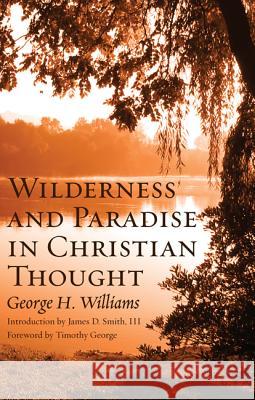Wilderness and Paradise in Christian Thought » książka
Wilderness and Paradise in Christian Thought
ISBN-13: 9781498224567 / Angielski / Miękka / 2016 / 266 str.
Wilderness and Paradise in Christian Thought
ISBN-13: 9781498224567 / Angielski / Miękka / 2016 / 266 str.
(netto: 121,11 VAT: 5%)
Najniższa cena z 30 dni: 125,43
ok. 16-18 dni roboczych.
Darmowa dostawa!
Paradise or wasteland--the wilderness has always been a challenge to Westerners. Wilderness and Paradise in Christian Thought traces the exciting theme of the quest for the wilderness--both physical and metaphysical--to create a new and important perspective for understanding Christian civilization. With a wealth of knowledge, a renowned historian presents the biblical understanding of the religious and ethical significance of the desert and how this understanding has influenced later Christian history and culture. Dr. Williams specifically applies the paradise theme to the university today and shows the continuing vitality of this ancient concept. ""By vivid illustrations the reader is given a sense of tremendous sweep, from the biblical beginnings down the generations to the American frontier. And the theme will open fresh perspectives on many movements other than those discussed."" --James H. Nichols, Federated Theological Faculty of the University of Chicago ""By tracing the recurring wilderness motif in Christian thought, Professor Williams has identified a theme which again and again gave Christians insight into the meaning of their pilgrimage. His account of the related paradise motif in the development of the university is equally illuminating and suggestive."" --Winthrop S. Hudson, Colgate-Rochester Divinity School ""Williams reminds me, both in versatility and in intensity of research, of the great historians whose names are familiar. Nobody living would have, or could have, written these studies except George Williams."" --John T. McNeill, author of History and Character of Calvinism ""This book would delight the mind and heart of a Milton or a Coleridge or a Jonathan Edwards. Here are wide-ranging scholarship, theological perspicacity, poetic imagination, informing a study that follows the course of two of the major seminal ideas--desert and paradise--that through the centuries have fructified the biblical and the later Christian mind."" --James Luther Adams, Harvard University George H. Williams (1914-2000) was Hollis Professor of Divinity at Harvard University. Among his works are The Radical Reformation, The Norman Anonymous of 1100 A.D., and ""The Role of the Layman in the Ancient Church."" He was an editor of Harvard Theological Review, and of Greek, Roman and Byzantine Studies, and a contributor to the Library of Christian Classics. Wilderness and Paradise in Christian Thought is an expansion of Dr. Williams's presidential address to the American Society of Church History. It was delivered on the fiftieth anniversary of Frederick Jackson Turner's famous paper presented to the American Historical Society on the influence of the frontier on American history.
Paradise or wasteland--the wilderness has always been a challenge to Westerners. Wilderness and Paradise in Christian Thought traces the exciting theme of the quest for the wilderness--both physical and metaphysical--to create a new and important perspective for understanding Christian civilization.With a wealth of knowledge, a renowned historian presents the biblical understanding of the religious and ethical significance of the desert and how this understanding has influenced later Christian history and culture.Dr. Williams specifically applies the paradise theme to the university today and shows the continuing vitality of this ancient concept.""By vivid illustrations the reader is given a sense of tremendous sweep, from the biblical beginnings down the generations to the American frontier. And the theme will open fresh perspectives on many movements other than those discussed.""--James H. Nichols, Federated Theological Faculty of the University of Chicago""By tracing the recurring wilderness motif in Christian thought, Professor Williams has identified a theme which again and again gave Christians insight into the meaning of their pilgrimage. His account of the related paradise motif in the development of the university is equally illuminating and suggestive.""--Winthrop S. Hudson, Colgate-Rochester Divinity School""Williams reminds me, both in versatility and in intensity of research, of the great historians whose names are familiar. Nobody living would have, or could have, written these studies except George Williams.""--John T. McNeill, author of History and Character of Calvinism ""This book would delight the mind and heart of a Milton or a Coleridge or a Jonathan Edwards. Here are wide-ranging scholarship, theological perspicacity, poetic imagination, informing a study that follows the course of two of the major seminal ideas--desert and paradise--that through the centuries have fructified the biblical and the later Christian mind.""--James Luther Adams, Harvard UniversityGeorge H. Williams (1914-2000) was Hollis Professor of Divinity at Harvard University. Among his works are The Radical Reformation, The Norman Anonymous of 1100 A.D., and ""The Role of the Layman in the Ancient Church."" He was an editor of Harvard Theological Review, and of Greek, Roman and Byzantine Studies, and a contributor to the Library of Christian Classics. Wilderness and Paradise in Christian Thought is an expansion of Dr. Williamss presidential address to the American Society of Church History. It was delivered on the fiftieth anniversary of Frederick Jackson Turners famous paper presented to the American Historical Society on the influence of the frontier on American history.











